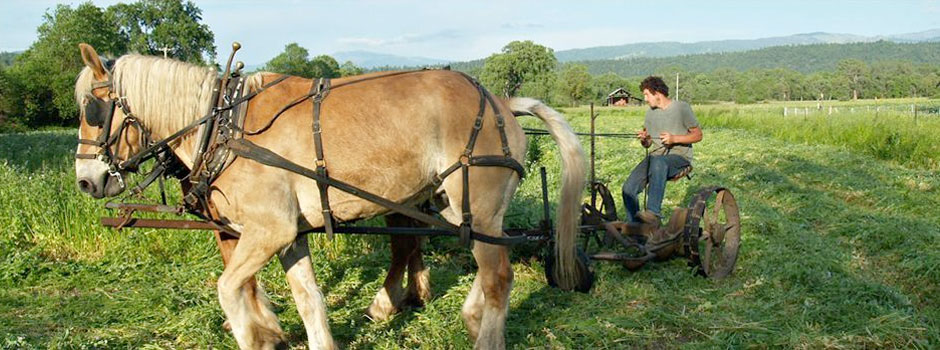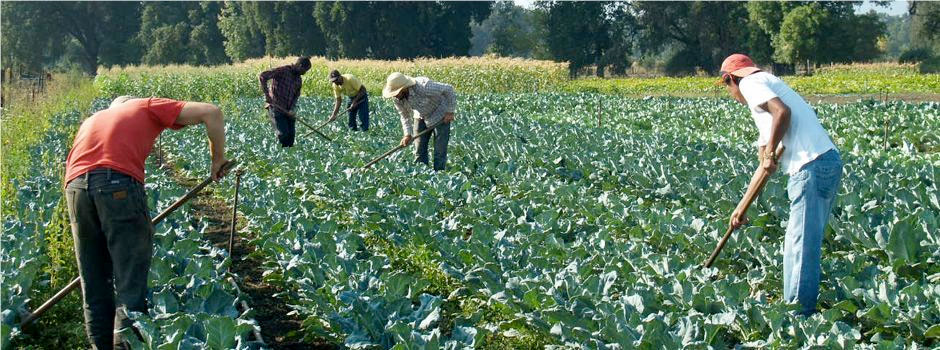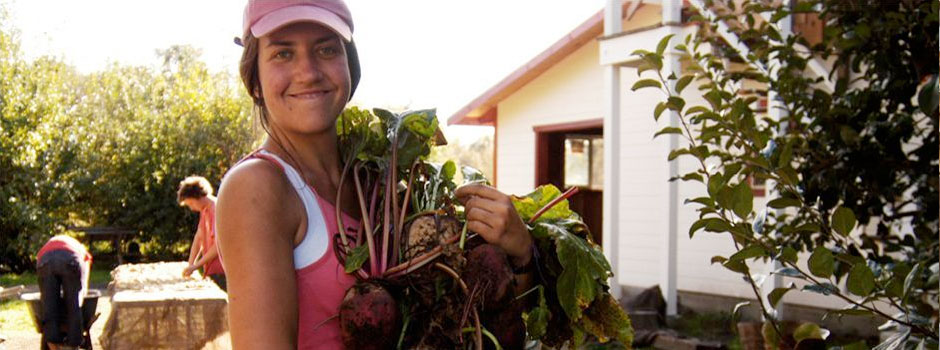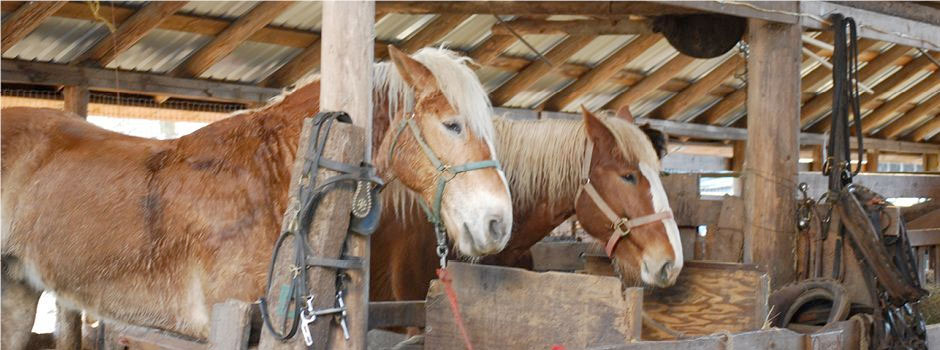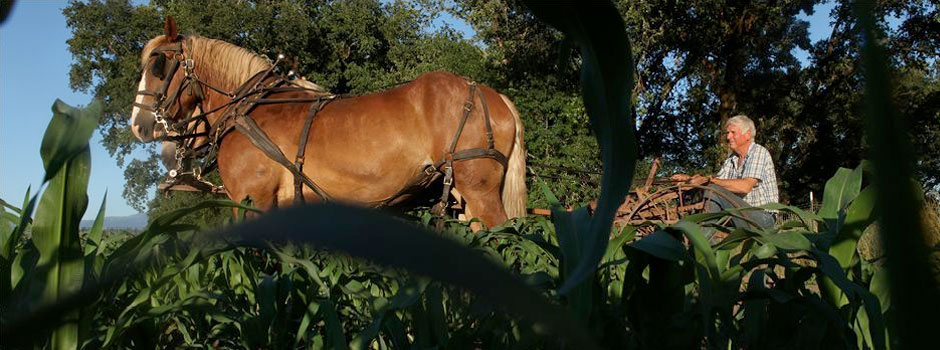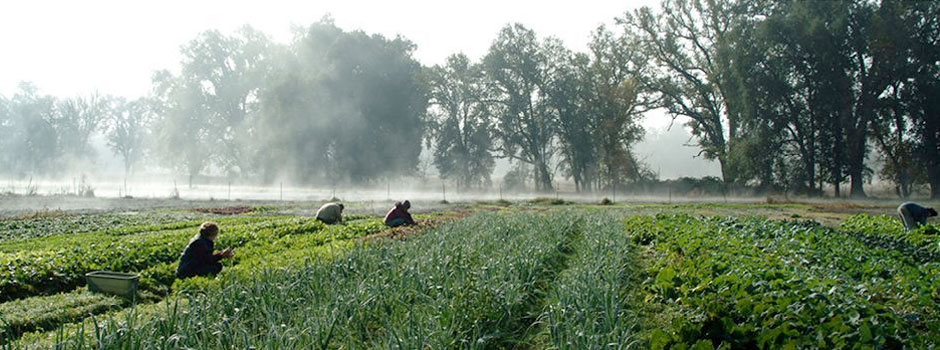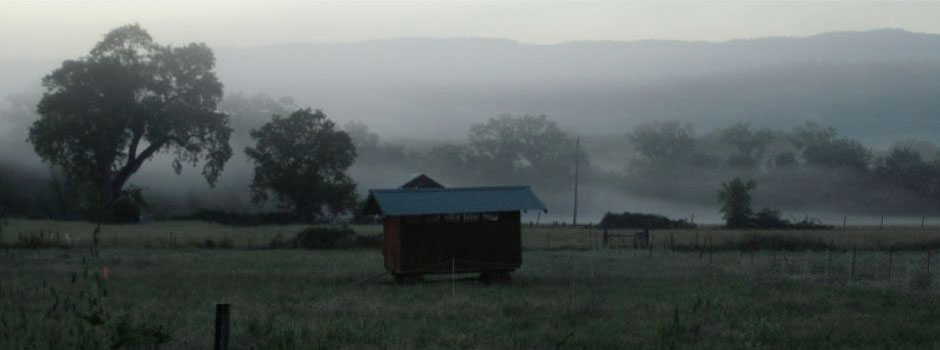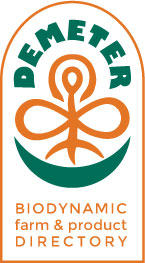“Healing people and the planet through agriculture”
Profiles in Farming
Stephen & Gloria Decater
Live Power Farm
What differentiates Stephen and Gloria Decater, innovators in farming since the early 1970s, is that unlike many who forged this path, four decades later they continue to identify challenges in sustainable, environmentally, and socially conscious farming, and lead the way towards a new farming paradigm with socio-economic solutions. The Decaters were early adopters of Biodynamic farming beginning in 1985. A few years later in 1988, they paved the way for Community Sustained Agriculture on the west coast, initiating the first entirely community based farm in California. Now, more than ever, people are yearning to connect with the food they eat, the people who farm it, and the farms themselves, and Gloria and Stephen have created a compelling model with their Live Power Community Farm.
Perhaps because they have always appreciated their farm as a whole farm organism, and also intuitively understood that for the farm to flourish they had to establish a sustainable business, they have followed a path from farmer’s market farming to community based farming and a much more conscious, personal, and mutually supportive relationship with the people eating food from the farm. Or, more simply, it’s because they held fast to their dreams by building community day after day, decade after decade. Believing in the inspirational powers of a garden, they established farm programs for city children attending Waldorf and private elementary and secondary schools in the San Francisco bay area, and the relationships which developed became the bridge leading to the founding of their community farm in 1988. In the early days, fifteen families supported their goals of long-term productivity and Biodynamic cultural practices to grow vigorous, productive soil, and achieve holistic environmental health. Today, their farm is supported entirely by more than 200 families and individuals, and by the school class visitation programs that continue to inspire hundreds of students each year.
What Stephen and Gloria have always understood is that farming is a community process that addresses community needs. Over the years they have consciously developed their farm by encouraging community involvement and interaction. They believe farms must not only provide healthy, nourishing food, but also create an avenue for people to re-enter the garden and develop the mindfulness, strength, and commitment to care for it. Their process integrates community partners who share in the operating cost of the farm, and who reap the whole life benefits of the harvest.
Live Power Community Farm is a 50-acre, diversified, Demeter certified Biodynamic farm committed to farming with the solar energy of draft horses and PV electric energy rather than fossil energy. Four acres are devoted to an intensive vegetable garden hosting some 60 varieties of vegetables and herbs. The Decaters use a glasshouse and cold frames to propagate vegetable and flower transplants, and grow home orchard fruits and field, and forage crops for hay, grain, and pasture. Animal husbandry includes draft horses, dairy and beef cows, feeder pigs, sheep, and laying hens. They butcher and process their own meat and bake bread in their outdoor, wood-fired brick oven.
In addition to hosting school class visits, Live Power Community farm participates in the North American Biodynamic Apprentice Training Program (NABDAP) providing mentoring and hands on skills and training for developing, operating, and managing a Biodynamic farm. After working with and being introduced as young people to Biodynamic agriculture by agricultural visionary Alan Chadwick in both the UCSC Garden Project and the Covelo Village Garden in the late sixties and early seventies, Gloria and Stephen continue the apprentice learning tradition with several beginning people of all ages each season.
Q. Your firm grasp on the socio-economic elements of farming is impressive. How have you been able to be pro-active in protecting your farm, while involving community when farming itself is so arduous?
A. The original concept behind CSA agriculture was that the farmers and the people eating the food from that farm would together form an association directed towards conscious mutual support of each other as well as care and support of the resource base of the living earth. The people eating food from the farm split the monetary costs of the annual operating budget, including living costs for the farmers, and thus become co-producers with the farmers. All of the food produced is given out to the co-producers. This associative economic relationship allows human values and considerations to come into the economic process and transforms the “bottom line” to the good of the whole living community, rather than the individual gain of particular parties eg. Stockholders or CEOs as often results in regular market capitalism. Associative economic principles are presented in Rudolf Steiner’s work, “Towards Social Renewal,” and “Threefold Social Order,” and also by other writers.
We’ve always had a core group of people to help when we’ve had challenges in development of the farm or business, and especially when securing the land. We try to make the whole process a conscious process to allow partners to have a place in the decision-making through the core group. At the beginning of the season, we gather as many of our supporters as we can for the first distribution of food, and initiate a discussion about associative economic principles. This includes them in a broader awareness of the different approach we are taking with agriculture — an approach that has a potential to create a viable economic base for the farm, which traditional farming doesn’t necessarily have.
Q. Please describe what you mean when you speak of the farm as an organism.
A. We look at the farm as an individuality, a whole organism with all of its organs (soil/physical, plant/etheric, animal/astral and human/ego) present and contributing their unique life activity to the sustenance and health of each other and the whole farm individuality.
[To quote Rudolf Steiner’s agriculture lecture two, “A farm is true to its essential nature, in the best sense of the word, if it is conceived as a kind of individual entity in itself—a self-contained individuality. Every farm should approximate to this condition. This ideal cannot be absolutely attained, but it should be observed as far as possible. Whatever you need for agricultural production, you should try to possess it within the farm itself (including in the “farm,” needless to say, the due amount of cattle). Properly speaking, any manures or the like which you bring into the farm from outside should be regarded rather as a remedy for a sick farm. This is the ideal. A thoroughly healthy farm should be able to produce within itself all that it needs.]
Our Biodynamic farm is unique, as a whole farm organism, in that we try to carry this principle throughout the farm. The compost for maintaining the vegetables is created from the farm’s livestock and crop residue, and we generate about 50 tons of compost a year. In 35 years of growing vegetables, we have not had to bring in compost foreign to the farm and the soil and crop quality is better than when we started. The same is true for animal feed — we’re trying to create this out of farm organism too.
Rudolf Steiner’s agriculture lectures refer to the farm as a “self-contained individuality” – and indicate that the ideal is to produce what you need for agricultural production-compost, animal feed, etc. from within your own farm organism. When you bring these things in from outside you are actually stepping out of the particular balances, adaptations, and life forces that would be supplied by your own farm organism, and introducing foreign elements which may limit your farm’s ability to achieve overall holistic health, integrity, and quality.
It is amazing that this also happens to be a perfect description for what true sustainability in agriculture would be. Not only in terms of materials but also in relation to energy use and the carbon footprint affecting our climate and our lives. Modern “sustainable” agriculture is often getting fertility, feed, the associated transportation, and energy for water pumping/mechanical needs from off the farm. The pollution and carbon footprint generated by this approach to organizing agriculture is huge and could be largely avoided by producing those needs and circulating them within the individual farm organism.
The idea is that the needs of the farm are created out of the farm organism, and having a farm broad enough to achieve this. We’re getting the tillage energy from the farm horses and electrical energy for water pumping and other needs from a large PV installation. We are not entirely free of fossil energy, but we are trying to minimize its use as much as possible. In our case part of our food goes directly to local households in Mendocino County and some to San Francisco, which is still within 150 miles. It would be Ideal to have all our food used in our own community.
How do we get people to understand their role in agriculture? Everyone who is eating is performing a role in agriculture. Wendell Berry states “Eating is an agricultural act.” We’re trying to encourage people to direct their food dollars to a local farm, creating a socio-economic model that encourages a more conscious community — with people who understand how their food is grown and thus keep their source personal and vital and viable.
We firmly believe that to create a sustainable agriculture necessitates that we first create a sustainable economic process — a process that evaluates the needs of all the players, beginning with respecting the earth in a healthy way. A vibrant farm is only possible when the needs of the farmer are met, new farmers are nurtured, and those being fed from the farm are integrated into the process. The human organ of the farm is not just the farmer, it’s everyone who eats food from this farm. Adam comes from the word dirt. In other words, there is a bit of the farm in everyone. Farming does affect people, there is a spiritual connection with the earth that people need to have in their lives to be complete. It is our goal to give our community this connection with our farm.
Q. Please describe the importance of your community as partners in farming.
A. One aspect of the farm is developing the relationship and consciousness of all the people involved, with the intention that they become more aware of their role in agriculture. It means creating a community that has an understanding of the issues facing agriculture and empowering this community to vote with their dollars. They can mold agriculture for the future, which they can only do if they have a vision of the social, environmental approach to agriculture. Farmers cannot do this alone; it can only be done through the whole human community becoming aware and working together. That’s what we’re trying to create — a farm where people come and see, in the food and experience, and appreciate in their lives the tremendous gift of beauty, abundance, and love that is the natural expression of the living world. When they walk into the farm they get it, thinking, “This is my church, and I want to support it.” – Alan Chadwick was creating gardens where nature had such a strong voice — with the soul of the plant world speaking to humans. And, these humans couldn’t help but be moved. When we love something we care for it.
Q. So what’s next at Live Power Community Farm?
A. It would be great to have additional land and housing so we can complete our Biodynamic farm organism. This would allow us to produce feed, fertilizer, and energy all from our own land — to have a closed system where we operate as a self-sufficient organism.
We wish to thrive as a 100% Community Based Farm — our interpretation of the new CSA. By conscious choice, we’re inviting community to join us as partners to ensure that through our farm we not only feed people healthy, Biodynamic quality food, but also that we have the relationships to create and spread this awareness. It’s all about growing the awareness of more and more people who can then make the right choices about how to nourish their bodies, feed their families, and appreciate and care for the living world.
Q. Looking into the future, what could influence a greater appreciation of Biodynamic family farms?
A. If more people could gather together in direct social and associative economic relationship with a particular local farm individuality and help ensure its development and viability, we could create many producing, truly sustainable Biodynamic farms. This would increase supply and access to the nurturing and nutritional quality and power of Biodynamic food, and the physical and spiritual forces it can bring into our lives to give us the strength and consciousness that we need to move forward in healing our future.
Written by Marie Gewirtz, owner Marie Gewirtz Marketing and Public Relations
“The original concept behind CSA agriculture was that the farmers and the people eating the food from that farm would together form an association directed towards conscious mutual support of each other as well as care and support of the resource base of the living earth.”
- Stephen & Gloria Decater
Live Power Community Farm
---------------------
Previous Profiles in Farming
- Lone Willow Ranch
- Sustainable Settings
- Spring Planting
- Biodynamic Dairies
- Santiago Peralta & Carla Barboto
- Stephen & Gloria Decater
- Stephen & Bill Steele
- Deb Soule
